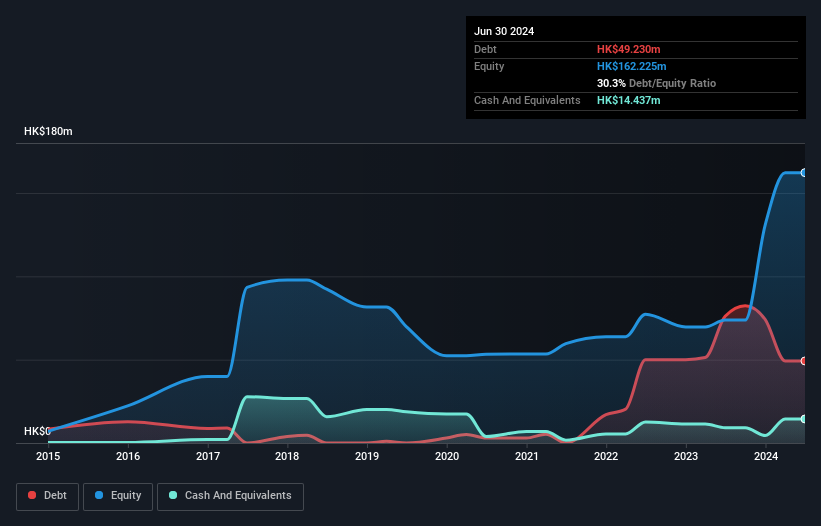
Some say volatility, rather than debt, is the best way to think about risk as an investor, but Warren Buffett famously said that 'Volatility is far from synonymous with risk.' When we think about how risky a company is, we always like to look at its use of debt, since debt overload can lead to ruin. We note that GME Group Holdings Limited (HKG:8188) does have debt on its balance sheet. But the more important question is: how much risk is that debt creating?
Why Does Debt Bring Risk?
Debt is a tool to help businesses grow, but if a business is incapable of paying off its lenders, then it exists at their mercy. In the worst case scenario, a company can go bankrupt if it cannot pay its creditors. While that is not too common, we often do see indebted companies permanently diluting shareholders because lenders force them to raise capital at a distressed price. Of course, plenty of companies use debt to fund growth, without any negative consequences. When we think about a company's use of debt, we first look at cash and debt together.
Check out our latest analysis for GME Group Holdings
What Is GME Group Holdings's Debt?
You can click the graphic below for the historical numbers, but it shows that GME Group Holdings had HK$49.2m of debt in June 2024, down from HK$76.0m, one year before. However, because it has a cash reserve of HK$14.4m, its net debt is less, at about HK$34.8m.

How Strong Is GME Group Holdings' Balance Sheet?
The latest balance sheet data shows that GME Group Holdings had liabilities of HK$144.5m due within a year, and liabilities of HK$4.65m falling due after that. Offsetting these obligations, it had cash of HK$14.4m as well as receivables valued at HK$265.4m due within 12 months. So it actually has HK$130.7m more liquid assets than total liabilities.
This surplus liquidity suggests that GME Group Holdings' balance sheet could take a hit just as well as Homer Simpson's head can take a punch. On this view, lenders should feel as safe as the beloved of a black-belt karate master.
In order to size up a company's debt relative to its earnings, we calculate its net debt divided by its earnings before interest, tax, depreciation, and amortization (EBITDA) and its earnings before interest and tax (EBIT) divided by its interest expense (its interest cover). This way, we consider both the absolute quantum of the debt, as well as the interest rates paid on it.
GME Group Holdings's net debt is only 0.24 times its EBITDA. And its EBIT covers its interest expense a whopping 35.5 times over. So you could argue it is no more threatened by its debt than an elephant is by a mouse. Although GME Group Holdings made a loss at the EBIT level, last year, it was also good to see that it generated HK$136m in EBIT over the last twelve months. There's no doubt that we learn most about debt from the balance sheet. But it is GME Group Holdings's earnings that will influence how the balance sheet holds up in the future. So when considering debt, it's definitely worth looking at the earnings trend. Click here for an interactive snapshot.
But our final consideration is also important, because a company cannot pay debt with paper profits; it needs cold hard cash. So it is important to check how much of its earnings before interest and tax (EBIT) converts to actual free cash flow. Considering the last year, GME Group Holdings actually recorded a cash outflow, overall. Debt is usually more expensive, and almost always more risky in the hands of a company with negative free cash flow. Shareholders ought to hope for an improvement.
Our View
The good news is that GME Group Holdings's demonstrated ability to cover its interest expense with its EBIT delights us like a fluffy puppy does a toddler. But we must concede we find its conversion of EBIT to free cash flow has the opposite effect. Looking at the bigger picture, we think GME Group Holdings's use of debt seems quite reasonable and we're not concerned about it. While debt does bring risk, when used wisely it can also bring a higher return on equity. The balance sheet is clearly the area to focus on when you are analysing debt. However, not all investment risk resides within the balance sheet - far from it. We've identified 2 warning signs with GME Group Holdings , and understanding them should be part of your investment process.
If, after all that, you're more interested in a fast growing company with a rock-solid balance sheet, then check out our list of net cash growth stocks without delay.
New: Manage All Your Stock Portfolios in One Place
We've created the ultimate portfolio companion for stock investors, and it's free.
• Connect an unlimited number of Portfolios and see your total in one currency
• Be alerted to new Warning Signs or Risks via email or mobile
• Track the Fair Value of your stocks
Have feedback on this article? Concerned about the content? Get in touch with us directly. Alternatively, email editorial-team (at) simplywallst.com.
This article by Simply Wall St is general in nature. We provide commentary based on historical data and analyst forecasts only using an unbiased methodology and our articles are not intended to be financial advice. It does not constitute a recommendation to buy or sell any stock, and does not take account of your objectives, or your financial situation. We aim to bring you long-term focused analysis driven by fundamental data. Note that our analysis may not factor in the latest price-sensitive company announcements or qualitative material. Simply Wall St has no position in any stocks mentioned.
About SEHK:8188
GME Group Holdings
An investment holding company, engages in civil engineering works in Hong Kong.
Excellent balance sheet, good value and pays a dividend.
Market Insights
Community Narratives



